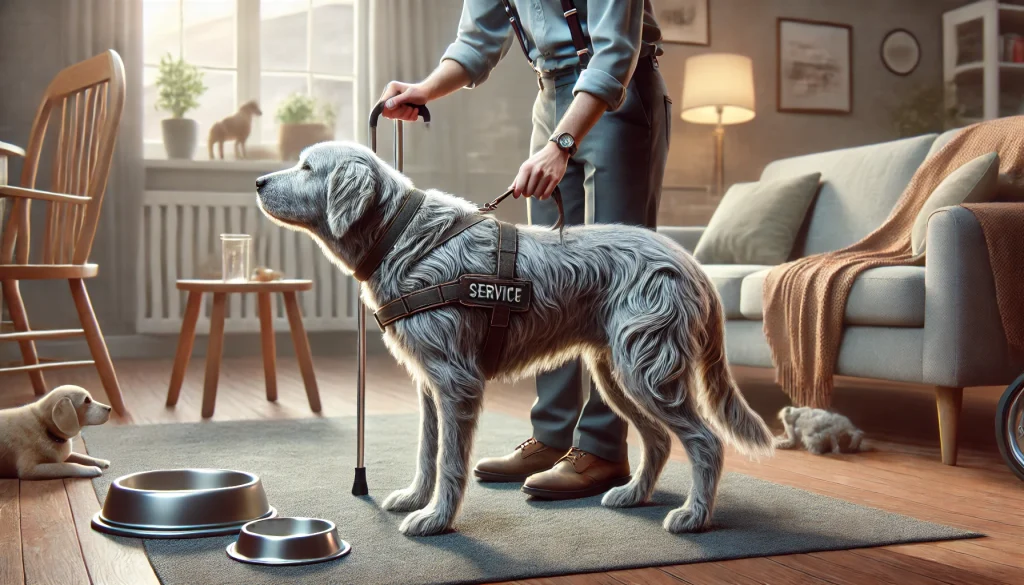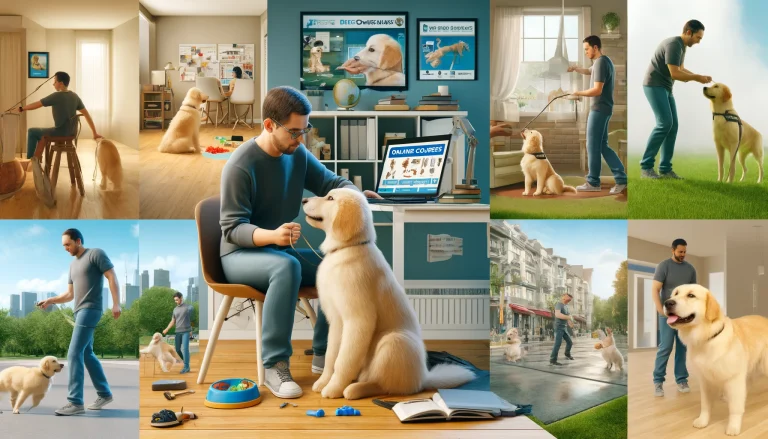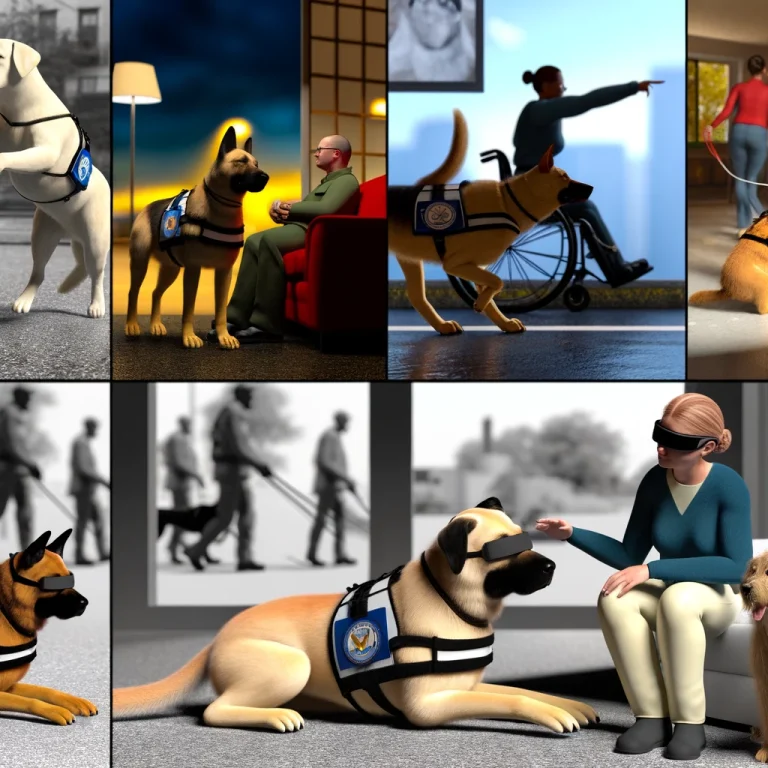Introduction
As our loyal service dogs age, their needs change. Providing proper care for your aging service dog is essential to ensure they remain healthy, comfortable, and happy. This blog post will cover crucial aspects of senior service dog care, including aging dog health tips and elderly service dog support. At ServicePupSolutions.com, we are committed to helping you provide the best care for your aging service dog.

Recognizing the Signs of Aging in Service Dogs
Physical Changes
As dogs age, they undergo several physical changes. These include graying fur, reduced energy levels, and slower movement. It’s essential to monitor these changes to provide appropriate care.
Behavioral Changes
Behavioral changes in aging service dogs can include increased sleeping, reduced interest in activities, and changes in appetite. Being aware of these changes can help you adjust their care routine to meet their needs.
Health Issues
Aging service dogs are more susceptible to health issues such as arthritis, dental problems, and vision or hearing loss. Regular veterinary check-ups are crucial to detect and manage these conditions early.
Senior Service Dog Care
Regular Veterinary Visits
Regular veterinary visits are essential for senior service dog care. These visits help monitor your dog’s health and catch any issues early. Your vet can recommend specific tests and treatments to keep your dog healthy.
Balanced Diet
A balanced diet is crucial for maintaining your senior service dog’s health. Consult your vet to determine the best diet for your dog’s age, weight, and health condition. Special senior dog food can help manage weight and support joint health.
Regular Exercise
While older dogs may not have the same energy levels as when they were younger, regular exercise is still vital. Adjust the intensity and duration of exercise to suit your dog’s capabilities. Gentle walks and low-impact activities are ideal.
Mental Stimulation
Mental stimulation is just as important as physical exercise for aging service dogs. Provide puzzle toys, training sessions, and new experiences to keep their minds sharp and engaged.

Aging Dog Health Tips
Joint Health
Joint health is a significant concern for aging dogs. Supplements such as glucosamine and chondroitin can help maintain joint health. Additionally, consider providing orthopedic beds to support their joints while resting.
Dental Care
Dental health is crucial for overall well-being. Regular brushing and dental chews can help maintain your dog’s dental health. Schedule professional dental cleanings as recommended by your vet.
Vision and Hearing
As dogs age, they may experience vision and hearing loss. Keep their environment consistent to help them navigate. Avoid moving furniture and use verbal and visual cues to communicate with your dog.
Weight Management
Maintaining a healthy weight is essential for your aging service dog’s health. Excess weight can exacerbate joint problems and lead to other health issues. Monitor their weight and adjust their diet and exercise routine as needed.
Elderly Service Dog Support
Comfort and Accessibility
Ensure your aging service dog has a comfortable and accessible living environment. Provide ramps for easy access to furniture and beds. Make sure their sleeping area is cozy and supportive.
Regular Grooming
Regular grooming is essential for your dog’s health and comfort. Brush their fur to prevent matting, trim their nails, and check for any skin issues. Grooming sessions also provide an opportunity to bond with your dog.
Managing Pain
Pain management is crucial for aging dogs, especially those with arthritis or other chronic conditions. Your vet can recommend appropriate pain relief options, including medications, supplements, and physical therapy.
Monitoring Behavior
Keep a close eye on your dog’s behavior. Changes in behavior can indicate underlying health issues or discomfort. Report any significant changes to your vet for further evaluation.
Importance of Pet Insurance and Service Dog Products
Pet Insurance
Investing in pet insurance for your aging service dog is crucial. Pet insurance can help cover the cost of routine veterinary care, emergency treatments, and specialized medical procedures. This ensures that your service dog receives the best possible care without financial strain.
Service Dog Products
Using the right service dog products can enhance your dog’s comfort and effectiveness. Consider products like orthopedic beds, joint supplements, and mobility aids. These products support your dog’s health and well-being as they age.
Self-Training Options
Resources for Self-Training
For those interested in self-training their service dog, ServiceDogOwners.com offers valuable resources. This includes training guides, instructional videos, and support forums. Self-training can be a cost-effective and personalized approach to preparing your service dog for their role.
Real Stories of Caring for Aging Service Dogs
Lucy’s Experience
Lucy, who has a service dog named Max, shares her story of caring for Max as he ages. “Max has been my rock for years. As he gets older, I make sure he has regular vet visits and a comfortable place to rest. Pet insurance has been a lifesaver, covering many of his medical expenses.”
Tom’s Journey
Tom, a veteran with PTSD, talks about his service dog, Buddy. “Buddy has been with me through thick and thin. Now that he’s older, I focus on his joint health and give him plenty of love and attention. Investing in the right products has made a huge difference in his comfort.”
The Future of Caring for Aging Service Dogs
As our understanding of senior dog care evolves, new products and treatments will become available. Continued research into aging dog health tips and elderly service dog support will lead to better care options. This progress will help ensure that service dogs can continue to provide invaluable support throughout their lives.
Conclusion
Caring for an aging service dog requires attention to their changing needs. By following senior service dog care guidelines, implementing aging dog health tips, and providing elderly service dog support, you can ensure your loyal companion enjoys their golden years.
At ServicePupSolutions.com, we are dedicated to helping you care for your service dog at every stage of their life. Investing in pet insurance and using the right service dog products can further enhance their health and well-being. Whether you choose professional training or self-training options through ServiceDogOwners.com, ensuring your service dog is well-prepared and cared for is essential.
By understanding the needs of aging service dogs, you can provide the best care possible, ensuring they remain happy, healthy, and able to support you for as long as possible.
Searching for a way to boost your income while keeping your service dog by your side? Learn how to launch a Side Hustle or new career and increase your earnings alongside your loyal companion. Click Here to find out more and start your journey today!






